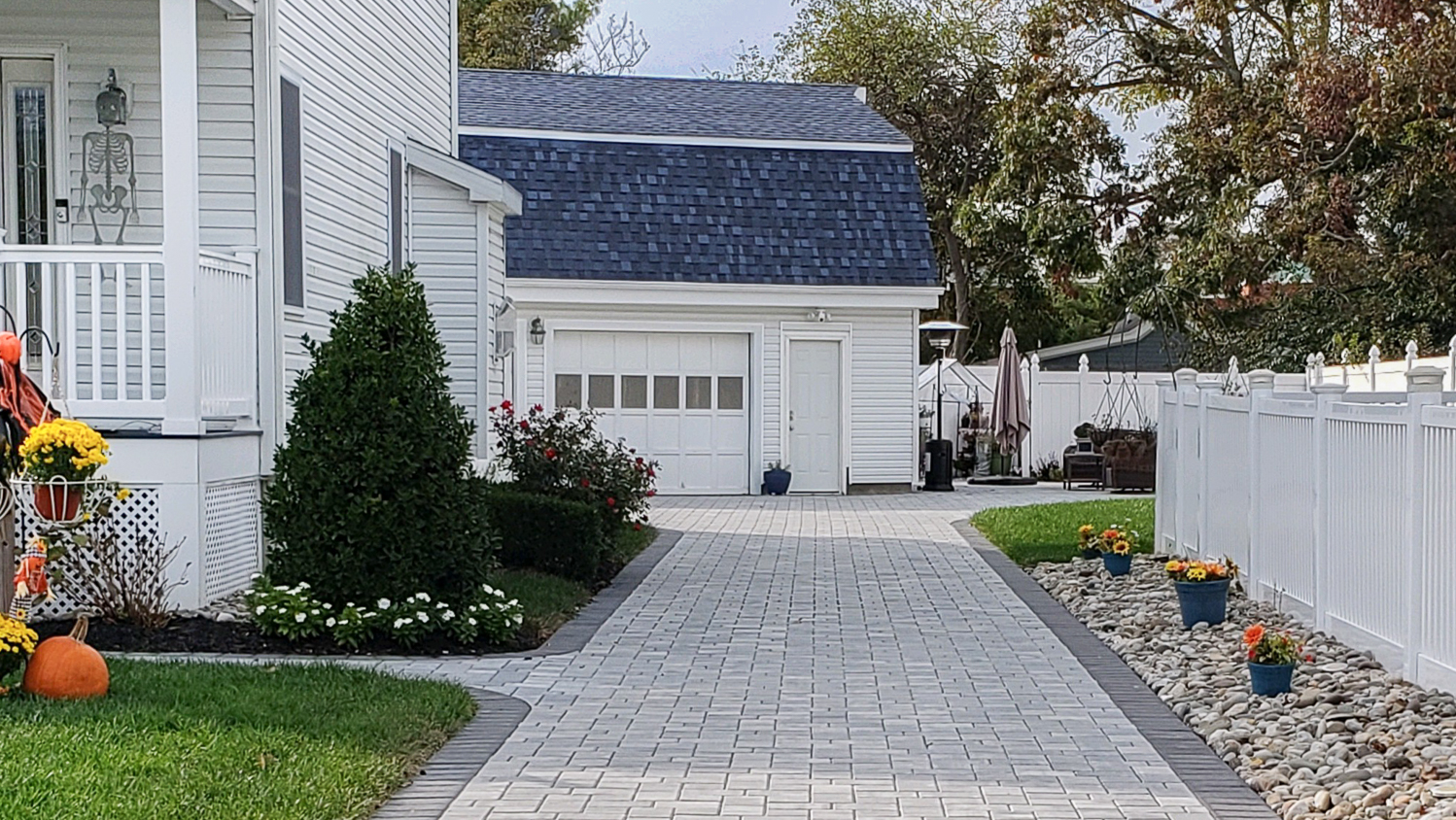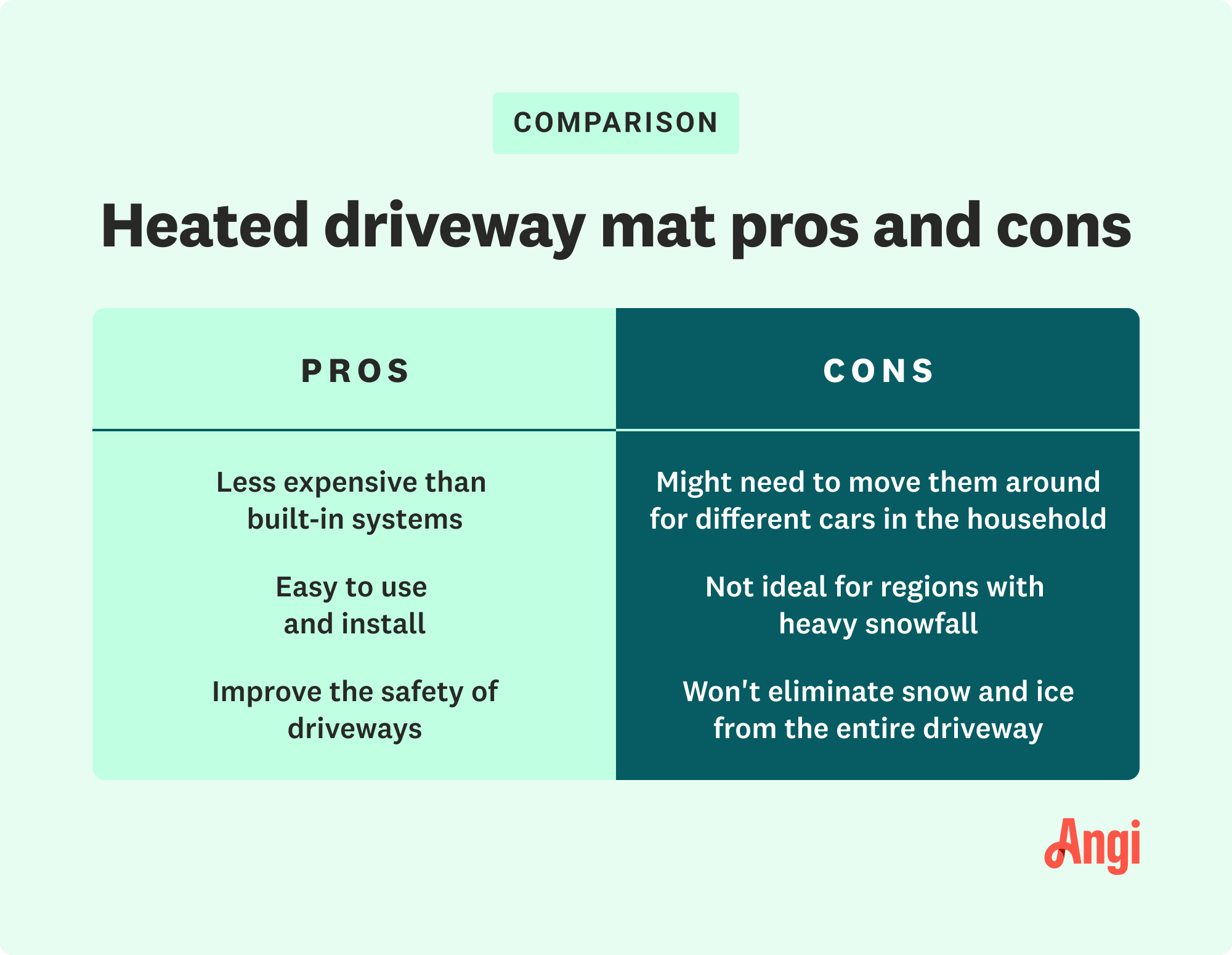
Discover the average paver driveway cost, including price ranges, key cost factors, and tips to help you budget for your driveway project.
Stay warm and toasty this winter while these heated driveway mats do the tough work for you.


Heated driveway mats improve driveway safety
The mats are less expensive than built-in heating systems
Driveway mats aren't ideal for regions that experience heavy snow
They're relatively simple to use and install
If deicing or shoveling your driveway isn't at the top of your list of fun things to do, heated driveway mats are a great option. Powered by electricity, these handy mats can melt snow and ice on your driveway, making it much safer to drive on while saving you from shivering outside while shoveling in the morning. They're also much less expensive than built-in heated driveway systems. This guide covers everything you need to know about heated driveway mats, including how they work and their pros and cons, so you can make an informed choice for your home.
Heated driveway mats are long mats consisting of electric heating elements sandwiched between polyurethane or rubber. They're used to melt snow and ice to make driving conditions safer and easier. And since they're designed for cars to sit and drive on top of, they're extremely durable.
Heated driveway mats typically come in various sizes to fit different driveways. You can also use them on porches, walkways, and entryways to help prevent slips and falls.
The mat is one piece comprising a heating element embedded in highly durable polyurethane or rubber. It's attached to a power cord that you'll need to plug into a nearby outlet for the mat to work. Once plugged in, the mat will begin heating up, evenly distributing the heat throughout the mat.
These mats are portable, so rather than leave them on your driveway all year round, you'll typically only use them during the winter months when snow and ice is commonly in the forecast. They're also usually long and thin, so they're not designed to fit the entire size of your driveway. Instead, they form two parallel lines that should match the width of your car tires, forming two tracks that you can drive on.
Some heated driveway mats come with added features, like temperature sensors that allow them to automatically turn on once the temperature drops to freezing. They might also come with a timer or thermostat that you can use to regulate the temperature or schedule the mat to turn on at a certain time.

Heated driveway mats can cost anywhere from $250 to $2,500 or more, but most homeowners will pay around $1,500 per mat. Costs heavily depend on the mat's size and features. Large mats with added features, like thermostats, timers, and temperature sensors, will fall at the higher end of the cost spectrum, while small, basic mats without additional features will cost near the lower end.
Like heated driveway mats, driveway heating systems are designed to melt the snow and ice on your driveway. But unlike mats, these radiant heating systems evenly distribute heat throughout your entire driveway, and they're built directly into it so they're a more permanent solution. This makes them better than driveway mats for regions that experience lots of heavy snowfall.
Since they're built into the driveway, you'll need to hire a local driveway company to install the system. The fact that they're permanent, professionally installed, and heat the entire driveway means that they're much more expensive than heated driveway mats. Heated driveways cost around $3,900, on average, but prices can range from $1,300 to $7,500 or more, depending on your driveway's size and the system's features.

Heated driveway mats offer several benefits. For starters, they make your driveway safer to drive on by reducing snow and ice. They're also much less expensive than a built-in heated driveway system. Plus, they're a breeze to install, so you won't need to hire a pro to do it for you.
A drawback of heated driveway mats is that you need to be mindful of their placement and make sure that they perfectly align with your car's tires. Since cars have varying widths, the parallel track you make with the mats might not fit all of the cars in your household. And since they don't span your entire driveway, they're not ideal for climates that experience very heavy snowfall.
Anyone who's sick and tired of shoveling and deicing their driveway when it's freezing out can benefit from heated driveway mats. However, because these mats don't heat the entire driveway, they're not the best solution for regions that experience lots of heavy snowfall on a regular basis. For those climates, a heated driveway system is a more effective solution.
From average costs to expert advice, get all the answers you need to get your job done.

Discover the average paver driveway cost, including price ranges, key cost factors, and tips to help you budget for your driveway project.

Is your driveway totaled? The price of repaving your driveway can save you from repair and resurfacing costs that are no longer worth the investment.

The cost of a tar and chip driveway falls between gravel and asphalt. Is this unique process the happy medium you've been looking for? Let's take a look.

Asphalt driveways take anywhere from 48 to 72 hours to dry enough for vehicles. Stay tuned to learn more about how long before you can drive on asphalt.

Learning how to remove driveway stains depends on the type of stain, your driveway, and your abilities. Luckily, these 8 methods are pretty simple. Learn more.

This guide shows you how to determine the right driveway width based on the size of your garage, the number of cars parked, the driveway style, and other factors.